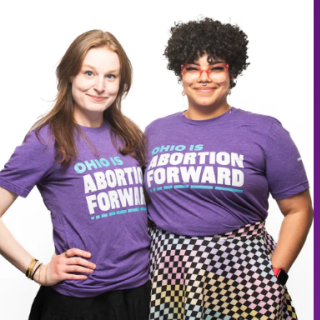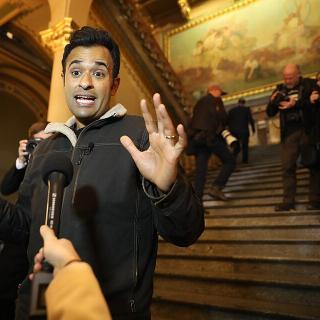Pastor Roscoe D. Robey of the 7th Avenue Community Missionary Baptist Church has helped support the Weinland Park area with his spirituality since 2009. His church has tangibly been a part of Weinland Park’s revitalization, albeit in an aggravating kind of way. And what he’s had to deal with – mixed-use development crowding his church on both sides – could be a “Zone In” harbinger of things to come for those homeowners or small businesses in Columbus’s major corridors.
Just a short walk up from High Street, the church has been a source of help and inspiration for the Weinland Park community for roughly 60 years. The congregation’s summer project of raising money for school supplies is underway, and they are mentoring young boys from the neighborhood who are in trouble, Pastor Robey told the Free Press.
“We have a big thumbprint, and often times when folks get into trouble and need a little help, they can come to us, and they come to us, because I lobby for things downtown,” said the Pastor who is pictured above top left.
One would believe a church would have some influence on Columbus’s exploding growth, especially when it is exploding all around you, and when the development is mostly overpriced student housing. The church hasn’t had much say on how these developments came to be, but this doesn’t mean all developers and new landlords scoffed at the church’s requests with disrespect and contempt.
Nevertheless, one thing is plainly clear for all to see. The two-story red brick church has become awkwardly sandwiched between two brutalist-style mixed-use apartment buildings, which was first reported on by former mayoral candidate Joe Motil for the Free Press.
“Overnight things began to change with development, and as you can see, we’ve been developed on both sides,” said Pastor Robey.
Zone In is City’s attempt to overhaul what they contend is a dated zoning code so to create more density – taller mixed-use in Columbus’s major corridors, such as High Street in Clintonville.
Through our conversation with Pastor Robey the Free Press learned that of the two developers and landlords which have crammed in his church, one has acted like a privileged bratty college student while the other has been a good neighbor and wants to work with the church to further support Weinland Park. The Free Press also learned that City officials, at the request of Pastor Robey, worked with the church’s good neighbor developer to allow subsidized housing in its building which is opening soon.
“I held the City to the fire for it too,” he said. “I told them, ‘You are all talking about subsidized housing. Now you need to put your money where your mouth is.’”
However, Pastor Robey says it was Weinland Park’s own civic association and area commission – the Weinland Park Community Civic Association (WPCCA) with help from the local pro-density group Neighbors 4 More Neighbors – which tried to leave his church out of any discussion regarding the good neighbor development (by Peerless Development Group of Chicago) directly to the church’s right if facing the church’s front door
Back in 2021, when Peerless first proposed their mixed-use 7-story apartment directly to replace a 3-story apartment, the WPCCA created a housing subcommittee so the two could work together to complete the project. As first reported by Joe Motil, chairing this subcommittee was WPCCA commissioner Michael Wilkos, who is also a major supporter of Neighbors 4 More Neighbors.
Pastor Robey, when first hearing the subcommittee had been formed, at once demanded the church have a voice on the subcommittee.
“When we spoke about it and tried to go through the process with them on this subcommittee, they didn’t really want to hear what we had to say, or what I had to say, or what the church had to say, or the team we created to be on this subcommittee,” he said. “So we pulled out and didn’t sign the MOU [Memorandum Of Understanding] because we didn’t agree with it.”
But then a very unexpected thing happened.
“That’s when Peerless actually came and sat down with us. And we started passing along our concerns,” he said. “As a result of that we didn’t get what we hoped for out of it. Our actual hope was they wouldn’t do anything with it. Just left it as it was. At least when they talked to us and they heard our concerns, they lowered the height of the building [from 7 stories to 5].”
Pastor Robey continued, “We have been able to work with Peerless throughout the process. They told [the landlord] that any concerns we had, they had to be addressed immediately. If something was damaged, it had to be fixed immediately. And now that they are coming to the close of this process, they are getting ready to relandscape some of the areas. They are going replace things.”
Peerless even went a step further to make amends and establish peace.
“We have this sealed agreement in writing to where they are going to support whatever outreach endeavors the church has,” said Pastor Robey. “They have invited me to the table to meet with top management. They have made a lot of concessions to work with us, and in return, we are working with them.”
On the church’s immediate left, however, both the developer and landlord have acted like spoiled and privileged [white] children towards the church.
“They made zero effort to be a good neighbor,” says Pastor Robey. “We don’t have a relationship with them.”
Weirdly named the “Uncommons” (“It’s all yours. Embrace the Uncommon”), which is another Chicago-based a national developer building mixed-use, they promise a “walkable mixed-use community devoted to honest dialogue, provocative ideas, and empathetic collaboration.”
“As it relates to the Uncommons project we weren’t really given much respect at all. We didn’t even know that this project being done until we saw some people doing some estimating and making decisions. And then we received a notification [from the City of Columbus]’,” he said.
The situation only became more exasperating.
“They didn’t work with us. Wouldn’t agree to anything. And so there has been no good relations between us and them. As a matter of fact, they threatened us,” says Pastor Robey.
They called the police on an African American Pastor?
“They threatened to call the cops on the church after we asked them to remove items that they had put on our property,” he said. “What has happened is we have made a mutual agreement. That they stay off our grounds and we stay off theirs.”



